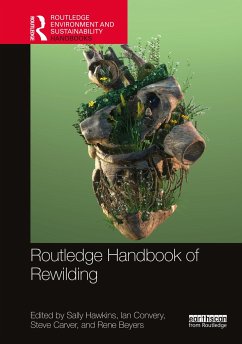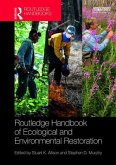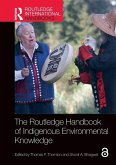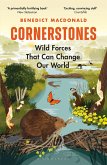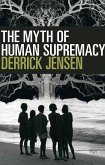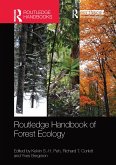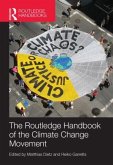Routledge Handbook of Rewilding
Herausgeber: Convery, Ian; Carver, Steve; Hawkins, Sally; Beyers, Rene
Routledge Handbook of Rewilding
Herausgeber: Convery, Ian; Carver, Steve; Hawkins, Sally; Beyers, Rene
- Gebundenes Buch
- Merkliste
- Auf die Merkliste
- Bewerten Bewerten
- Teilen
- Produkt teilen
- Produkterinnerung
- Produkterinnerung
This handbook provides a comprehensive overview of the history, theory and current practices of rewilding.
Andere Kunden interessierten sich auch für
![Routledge Handbook of Rewilding Routledge Handbook of Rewilding]() Routledge Handbook of Rewilding69,99 €
Routledge Handbook of Rewilding69,99 €![Routledge Handbook of Ecological and Environmental Restoration Routledge Handbook of Ecological and Environmental Restoration]() Routledge Handbook of Ecological and Environmental Restoration308,99 €
Routledge Handbook of Ecological and Environmental Restoration308,99 €![The Routledge Handbook of Indigenous Environmental Knowledge The Routledge Handbook of Indigenous Environmental Knowledge]() The Routledge Handbook of Indigenous Environmental Knowledge48,99 €
The Routledge Handbook of Indigenous Environmental Knowledge48,99 €![Cornerstones Cornerstones]() Benedict MacdonaldCornerstones17,99 €
Benedict MacdonaldCornerstones17,99 €![The Myth of Human Supremacy The Myth of Human Supremacy]() Derrick JensenThe Myth of Human Supremacy22,99 €
Derrick JensenThe Myth of Human Supremacy22,99 €![Routledge Handbook of Forest Ecology Routledge Handbook of Forest Ecology]() Routledge Handbook of Forest Ecology88,99 €
Routledge Handbook of Forest Ecology88,99 €![Routledge Handbook of the Climate Change Movement Routledge Handbook of the Climate Change Movement]() Routledge Handbook of the Climate Change Movement305,99 €
Routledge Handbook of the Climate Change Movement305,99 €-
-
-
This handbook provides a comprehensive overview of the history, theory and current practices of rewilding.
Hinweis: Dieser Artikel kann nur an eine deutsche Lieferadresse ausgeliefert werden.
Hinweis: Dieser Artikel kann nur an eine deutsche Lieferadresse ausgeliefert werden.
Produktdetails
- Produktdetails
- Routledge Environment and Sustainability Handbooks
- Verlag: Taylor & Francis Ltd
- Seitenzahl: 396
- Erscheinungstermin: 30. November 2022
- Englisch
- Abmessung: 252mm x 182mm x 28mm
- Gewicht: 854g
- ISBN-13: 9780367564483
- ISBN-10: 0367564483
- Artikelnr.: 64665526
- Herstellerkennzeichnung
- Libri GmbH
- Europaallee 1
- 36244 Bad Hersfeld
- gpsr@libri.de
- Routledge Environment and Sustainability Handbooks
- Verlag: Taylor & Francis Ltd
- Seitenzahl: 396
- Erscheinungstermin: 30. November 2022
- Englisch
- Abmessung: 252mm x 182mm x 28mm
- Gewicht: 854g
- ISBN-13: 9780367564483
- ISBN-10: 0367564483
- Artikelnr.: 64665526
- Herstellerkennzeichnung
- Libri GmbH
- Europaallee 1
- 36244 Bad Hersfeld
- gpsr@libri.de
Sally Hawkins is an environmental social scientist at the University of Cumbria, UK. She is a core member of the IUCN CEM Rewilding Thematic Group and a founding trustee of the Lifescape Project. Ian Convery is Professor of Environment & Society at the University of Cumbria, co-chairs the IUCN CEM Rewilding Thematic Group, and is chair of IUCN CEM Western Europe. Steve Carver is Director of the Wildland Research Institute at the University of Leeds, UK, and Co-Chair of the IUCN CEM Rewilding Thematic Group. Rene L. Beyers is a Research Associate in the Beaty Biodiversity Research Centre at the University of British Columbia, Canada.
SECTION 1 THE EVOLUTION OF REWILDING
1. Introduction: What is rewilding?
Sally Hawkins, Rene Beyers, Steve Carver and Ian Convery
2. The emergence of rewilding in North America
Mark Fisher and Steve Carver
3. The emergence of rewilding in Europe
Alexandra Locquet and Steve Carver
4. Ecological restoration and rewilding: Integrating communities of
practice to achieve common goals
Cara R. Nelson
5. Developing a framework for rewilding based on its social-ecological
aims
Sally Hawkins
SECTION 2 THEORETICAL AND PRACTICAL UNDERPINNINGS OF REWILDING
6. Trophic cascades as a basis for rewilding
T.J. Clark-Wolf and Mark Hebblewhite
7. Species translocations, taxon replacements, and rewilding
Mark Stanley-Price
8. Cores and corridors: Natural landscape linkages to rewild protected
areas and wildlife refuges
Jonathan Carruthers-Jones, Andrew Gregory and Adrien Guette
9. Mapping wildness and opportunities for rewilding
Steve Carver
10. Measuring success in rewilding: Ecological overview
René Beyers and Antony R.E. Sinclair
11. Measuring success in rewilding? Coping with socio-ecological
uncertainties in rewilding projects
Meredith Root-Bernstein
12. Rewilding 'knowledges': Blending science and Indigenous knowledge
systems
Lisa Fenton and Zoe Playdon
13. Rewilding: A legal perspective
Adam Eagle, Alex Cooper, Rob Espin, Jack Gould and Elsie
Blackshaw-Crosby
SECTION 3 APPLICATION AND IMPACTS OF REWILDING
14. Rewilding case study: Yellowstone to Yukon
Jodi Hilty, Charles Chester and Pamela Wright
15. Rewilding case study: Carrifran Wildwood
Stuart Adair and Philip Ashmole
16. Rewilding case study: Going wild in Argentina, a multidisciplinary
and multispecies reintroduction programme to restore ecological
functionality
Emiliano Donadio, Talía Zamboni and Sebastián Di Martino
17. Rewilding case study: Gorongosa National Park, Mozambique
Rob Pringle and Dominique Gonçalves
18. Rewilding case study: Restoring Western Australia's rangelands:
Mutawa/Kurrara Kurrara
Ian Kealley and Neil Burrows
19. Rewilding case study: Forest restoration: conservation outcomes and
lessons from Terai Arc Landscape, Nepal
Ananta Ram Bhandari and Shiv Raj Bhatta
20. Rewilding case study: Monitoring natural capital and rewilding at the
Natural Capital Laboratory, Birchfield, Loch Ness
Chris White, Emilia Leese, Ian Convery, and Philip Rooney
21. Eco-civilisation provides new opportunities for rewilding in China
Yue Cao, Zhicong Zhao, Rui Yang, Steve Carver, and Ian Convery
22. Restoring what we've lost: Lessons from evolutionary history for
rewilding and coexisting in landscapes with predators
Joanna E. Lambert and Joel Berger
23. Rewilding and farming: Could the relationship be improved through
adopting a three compartment approach to land use?
Julia Aglionby and Hannah Field
24. Unseen connections: The role of fungi in rewilding
David Sattori and Matt Wainhouse
25. Rewilding and human health
Heather VanVolkenburg, Rene Beyers, Cara Nelson, Liette Vasseur,
Angela Andrade, Ian Convery and Steve Carver
26. Rewilding, the wildlife trade, and human conflict
René Beyers and Sally Hawkins
27. Rewilding children and young people: The role of education and
schools
Heather Prince
28. Wild adventure: A restorying
Chris Loynes
SECTION 4 WILDER VALUES: THE ETHICS AND PHILOSOPHY OF REWILDING
29. Wilder values: The ethics and philosophy of rewilding
Kate Rawles (section editor)
30. Rewilding from the inside out: A personal commitment to other animals
and their homes during the Anthropause and afterwards
Marc Bekoff
31. Rewilding and cultural transformation: Healing nature and reweaving
humans back into the web of life.
Peter Taylor, Alan Watson Featherstone, Simon Ayres, Adam Griffin and
Eric Maddern
32. Wild democracy: Ecodemocracy in rewilding
Helen Kopnina, Simon Leadbeater, and Anja Heister
33. Rewilding and the ethics of place
Martin Drenthen
34. Knepp Wildland; the ethos and efficacy of Britain's first private
rewilding project
Simon Leadbeater, Helen Kopnina and Paul Cryer
35. Human rewilding: Practical pointers to address a root cause of global
environmental crises
Georgina Maffey and Koen Arts
1. Introduction: What is rewilding?
Sally Hawkins, Rene Beyers, Steve Carver and Ian Convery
2. The emergence of rewilding in North America
Mark Fisher and Steve Carver
3. The emergence of rewilding in Europe
Alexandra Locquet and Steve Carver
4. Ecological restoration and rewilding: Integrating communities of
practice to achieve common goals
Cara R. Nelson
5. Developing a framework for rewilding based on its social-ecological
aims
Sally Hawkins
SECTION 2 THEORETICAL AND PRACTICAL UNDERPINNINGS OF REWILDING
6. Trophic cascades as a basis for rewilding
T.J. Clark-Wolf and Mark Hebblewhite
7. Species translocations, taxon replacements, and rewilding
Mark Stanley-Price
8. Cores and corridors: Natural landscape linkages to rewild protected
areas and wildlife refuges
Jonathan Carruthers-Jones, Andrew Gregory and Adrien Guette
9. Mapping wildness and opportunities for rewilding
Steve Carver
10. Measuring success in rewilding: Ecological overview
René Beyers and Antony R.E. Sinclair
11. Measuring success in rewilding? Coping with socio-ecological
uncertainties in rewilding projects
Meredith Root-Bernstein
12. Rewilding 'knowledges': Blending science and Indigenous knowledge
systems
Lisa Fenton and Zoe Playdon
13. Rewilding: A legal perspective
Adam Eagle, Alex Cooper, Rob Espin, Jack Gould and Elsie
Blackshaw-Crosby
SECTION 3 APPLICATION AND IMPACTS OF REWILDING
14. Rewilding case study: Yellowstone to Yukon
Jodi Hilty, Charles Chester and Pamela Wright
15. Rewilding case study: Carrifran Wildwood
Stuart Adair and Philip Ashmole
16. Rewilding case study: Going wild in Argentina, a multidisciplinary
and multispecies reintroduction programme to restore ecological
functionality
Emiliano Donadio, Talía Zamboni and Sebastián Di Martino
17. Rewilding case study: Gorongosa National Park, Mozambique
Rob Pringle and Dominique Gonçalves
18. Rewilding case study: Restoring Western Australia's rangelands:
Mutawa/Kurrara Kurrara
Ian Kealley and Neil Burrows
19. Rewilding case study: Forest restoration: conservation outcomes and
lessons from Terai Arc Landscape, Nepal
Ananta Ram Bhandari and Shiv Raj Bhatta
20. Rewilding case study: Monitoring natural capital and rewilding at the
Natural Capital Laboratory, Birchfield, Loch Ness
Chris White, Emilia Leese, Ian Convery, and Philip Rooney
21. Eco-civilisation provides new opportunities for rewilding in China
Yue Cao, Zhicong Zhao, Rui Yang, Steve Carver, and Ian Convery
22. Restoring what we've lost: Lessons from evolutionary history for
rewilding and coexisting in landscapes with predators
Joanna E. Lambert and Joel Berger
23. Rewilding and farming: Could the relationship be improved through
adopting a three compartment approach to land use?
Julia Aglionby and Hannah Field
24. Unseen connections: The role of fungi in rewilding
David Sattori and Matt Wainhouse
25. Rewilding and human health
Heather VanVolkenburg, Rene Beyers, Cara Nelson, Liette Vasseur,
Angela Andrade, Ian Convery and Steve Carver
26. Rewilding, the wildlife trade, and human conflict
René Beyers and Sally Hawkins
27. Rewilding children and young people: The role of education and
schools
Heather Prince
28. Wild adventure: A restorying
Chris Loynes
SECTION 4 WILDER VALUES: THE ETHICS AND PHILOSOPHY OF REWILDING
29. Wilder values: The ethics and philosophy of rewilding
Kate Rawles (section editor)
30. Rewilding from the inside out: A personal commitment to other animals
and their homes during the Anthropause and afterwards
Marc Bekoff
31. Rewilding and cultural transformation: Healing nature and reweaving
humans back into the web of life.
Peter Taylor, Alan Watson Featherstone, Simon Ayres, Adam Griffin and
Eric Maddern
32. Wild democracy: Ecodemocracy in rewilding
Helen Kopnina, Simon Leadbeater, and Anja Heister
33. Rewilding and the ethics of place
Martin Drenthen
34. Knepp Wildland; the ethos and efficacy of Britain's first private
rewilding project
Simon Leadbeater, Helen Kopnina and Paul Cryer
35. Human rewilding: Practical pointers to address a root cause of global
environmental crises
Georgina Maffey and Koen Arts
SECTION 1 THE EVOLUTION OF REWILDING
1. Introduction: What is rewilding?
Sally Hawkins, Rene Beyers, Steve Carver and Ian Convery
2. The emergence of rewilding in North America
Mark Fisher and Steve Carver
3. The emergence of rewilding in Europe
Alexandra Locquet and Steve Carver
4. Ecological restoration and rewilding: Integrating communities of
practice to achieve common goals
Cara R. Nelson
5. Developing a framework for rewilding based on its social-ecological
aims
Sally Hawkins
SECTION 2 THEORETICAL AND PRACTICAL UNDERPINNINGS OF REWILDING
6. Trophic cascades as a basis for rewilding
T.J. Clark-Wolf and Mark Hebblewhite
7. Species translocations, taxon replacements, and rewilding
Mark Stanley-Price
8. Cores and corridors: Natural landscape linkages to rewild protected
areas and wildlife refuges
Jonathan Carruthers-Jones, Andrew Gregory and Adrien Guette
9. Mapping wildness and opportunities for rewilding
Steve Carver
10. Measuring success in rewilding: Ecological overview
René Beyers and Antony R.E. Sinclair
11. Measuring success in rewilding? Coping with socio-ecological
uncertainties in rewilding projects
Meredith Root-Bernstein
12. Rewilding 'knowledges': Blending science and Indigenous knowledge
systems
Lisa Fenton and Zoe Playdon
13. Rewilding: A legal perspective
Adam Eagle, Alex Cooper, Rob Espin, Jack Gould and Elsie
Blackshaw-Crosby
SECTION 3 APPLICATION AND IMPACTS OF REWILDING
14. Rewilding case study: Yellowstone to Yukon
Jodi Hilty, Charles Chester and Pamela Wright
15. Rewilding case study: Carrifran Wildwood
Stuart Adair and Philip Ashmole
16. Rewilding case study: Going wild in Argentina, a multidisciplinary
and multispecies reintroduction programme to restore ecological
functionality
Emiliano Donadio, Talía Zamboni and Sebastián Di Martino
17. Rewilding case study: Gorongosa National Park, Mozambique
Rob Pringle and Dominique Gonçalves
18. Rewilding case study: Restoring Western Australia's rangelands:
Mutawa/Kurrara Kurrara
Ian Kealley and Neil Burrows
19. Rewilding case study: Forest restoration: conservation outcomes and
lessons from Terai Arc Landscape, Nepal
Ananta Ram Bhandari and Shiv Raj Bhatta
20. Rewilding case study: Monitoring natural capital and rewilding at the
Natural Capital Laboratory, Birchfield, Loch Ness
Chris White, Emilia Leese, Ian Convery, and Philip Rooney
21. Eco-civilisation provides new opportunities for rewilding in China
Yue Cao, Zhicong Zhao, Rui Yang, Steve Carver, and Ian Convery
22. Restoring what we've lost: Lessons from evolutionary history for
rewilding and coexisting in landscapes with predators
Joanna E. Lambert and Joel Berger
23. Rewilding and farming: Could the relationship be improved through
adopting a three compartment approach to land use?
Julia Aglionby and Hannah Field
24. Unseen connections: The role of fungi in rewilding
David Sattori and Matt Wainhouse
25. Rewilding and human health
Heather VanVolkenburg, Rene Beyers, Cara Nelson, Liette Vasseur,
Angela Andrade, Ian Convery and Steve Carver
26. Rewilding, the wildlife trade, and human conflict
René Beyers and Sally Hawkins
27. Rewilding children and young people: The role of education and
schools
Heather Prince
28. Wild adventure: A restorying
Chris Loynes
SECTION 4 WILDER VALUES: THE ETHICS AND PHILOSOPHY OF REWILDING
29. Wilder values: The ethics and philosophy of rewilding
Kate Rawles (section editor)
30. Rewilding from the inside out: A personal commitment to other animals
and their homes during the Anthropause and afterwards
Marc Bekoff
31. Rewilding and cultural transformation: Healing nature and reweaving
humans back into the web of life.
Peter Taylor, Alan Watson Featherstone, Simon Ayres, Adam Griffin and
Eric Maddern
32. Wild democracy: Ecodemocracy in rewilding
Helen Kopnina, Simon Leadbeater, and Anja Heister
33. Rewilding and the ethics of place
Martin Drenthen
34. Knepp Wildland; the ethos and efficacy of Britain's first private
rewilding project
Simon Leadbeater, Helen Kopnina and Paul Cryer
35. Human rewilding: Practical pointers to address a root cause of global
environmental crises
Georgina Maffey and Koen Arts
1. Introduction: What is rewilding?
Sally Hawkins, Rene Beyers, Steve Carver and Ian Convery
2. The emergence of rewilding in North America
Mark Fisher and Steve Carver
3. The emergence of rewilding in Europe
Alexandra Locquet and Steve Carver
4. Ecological restoration and rewilding: Integrating communities of
practice to achieve common goals
Cara R. Nelson
5. Developing a framework for rewilding based on its social-ecological
aims
Sally Hawkins
SECTION 2 THEORETICAL AND PRACTICAL UNDERPINNINGS OF REWILDING
6. Trophic cascades as a basis for rewilding
T.J. Clark-Wolf and Mark Hebblewhite
7. Species translocations, taxon replacements, and rewilding
Mark Stanley-Price
8. Cores and corridors: Natural landscape linkages to rewild protected
areas and wildlife refuges
Jonathan Carruthers-Jones, Andrew Gregory and Adrien Guette
9. Mapping wildness and opportunities for rewilding
Steve Carver
10. Measuring success in rewilding: Ecological overview
René Beyers and Antony R.E. Sinclair
11. Measuring success in rewilding? Coping with socio-ecological
uncertainties in rewilding projects
Meredith Root-Bernstein
12. Rewilding 'knowledges': Blending science and Indigenous knowledge
systems
Lisa Fenton and Zoe Playdon
13. Rewilding: A legal perspective
Adam Eagle, Alex Cooper, Rob Espin, Jack Gould and Elsie
Blackshaw-Crosby
SECTION 3 APPLICATION AND IMPACTS OF REWILDING
14. Rewilding case study: Yellowstone to Yukon
Jodi Hilty, Charles Chester and Pamela Wright
15. Rewilding case study: Carrifran Wildwood
Stuart Adair and Philip Ashmole
16. Rewilding case study: Going wild in Argentina, a multidisciplinary
and multispecies reintroduction programme to restore ecological
functionality
Emiliano Donadio, Talía Zamboni and Sebastián Di Martino
17. Rewilding case study: Gorongosa National Park, Mozambique
Rob Pringle and Dominique Gonçalves
18. Rewilding case study: Restoring Western Australia's rangelands:
Mutawa/Kurrara Kurrara
Ian Kealley and Neil Burrows
19. Rewilding case study: Forest restoration: conservation outcomes and
lessons from Terai Arc Landscape, Nepal
Ananta Ram Bhandari and Shiv Raj Bhatta
20. Rewilding case study: Monitoring natural capital and rewilding at the
Natural Capital Laboratory, Birchfield, Loch Ness
Chris White, Emilia Leese, Ian Convery, and Philip Rooney
21. Eco-civilisation provides new opportunities for rewilding in China
Yue Cao, Zhicong Zhao, Rui Yang, Steve Carver, and Ian Convery
22. Restoring what we've lost: Lessons from evolutionary history for
rewilding and coexisting in landscapes with predators
Joanna E. Lambert and Joel Berger
23. Rewilding and farming: Could the relationship be improved through
adopting a three compartment approach to land use?
Julia Aglionby and Hannah Field
24. Unseen connections: The role of fungi in rewilding
David Sattori and Matt Wainhouse
25. Rewilding and human health
Heather VanVolkenburg, Rene Beyers, Cara Nelson, Liette Vasseur,
Angela Andrade, Ian Convery and Steve Carver
26. Rewilding, the wildlife trade, and human conflict
René Beyers and Sally Hawkins
27. Rewilding children and young people: The role of education and
schools
Heather Prince
28. Wild adventure: A restorying
Chris Loynes
SECTION 4 WILDER VALUES: THE ETHICS AND PHILOSOPHY OF REWILDING
29. Wilder values: The ethics and philosophy of rewilding
Kate Rawles (section editor)
30. Rewilding from the inside out: A personal commitment to other animals
and their homes during the Anthropause and afterwards
Marc Bekoff
31. Rewilding and cultural transformation: Healing nature and reweaving
humans back into the web of life.
Peter Taylor, Alan Watson Featherstone, Simon Ayres, Adam Griffin and
Eric Maddern
32. Wild democracy: Ecodemocracy in rewilding
Helen Kopnina, Simon Leadbeater, and Anja Heister
33. Rewilding and the ethics of place
Martin Drenthen
34. Knepp Wildland; the ethos and efficacy of Britain's first private
rewilding project
Simon Leadbeater, Helen Kopnina and Paul Cryer
35. Human rewilding: Practical pointers to address a root cause of global
environmental crises
Georgina Maffey and Koen Arts

